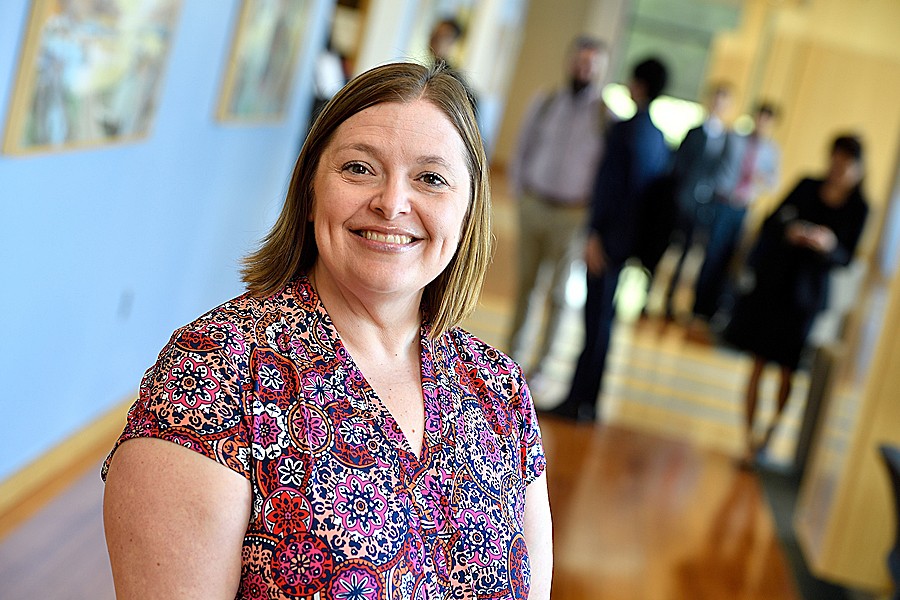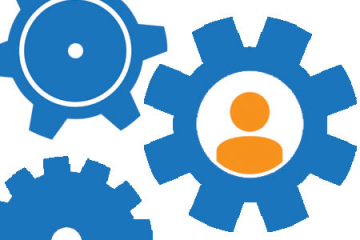Whether they're in Hong Kong or Houston or sitting in the comfortable confines of the Career Development Office in Harbor East, students in the Johns Hopkins Carey Business School are never far from the carefully considered career coaching of Tracy Carter, Carey's Baltimore-based assistant director of coaching and education. Curious about what it takes to help business students succeed after graduation—hint: it's so much more than critiquing resumes—we chatted recently with Carter, who has worked for Johns Hopkins for 21 years and has been in her current position for two.
So, what does an assistant director of coaching and education do?
At its core, what it involves is engaging with students and helping them understand what the next step of their journey is going to look like, and then helping them figure out how to get there. I think what it isn't: It is not placement. We do a lot of work to help students get jobs, but the larger picture of what I do is helping students understand what feeds their soul and what is the thing that when they wake up in the morning they're just so excited to do. For me, the most important part of what I do is building that relationship with students so that they feel comfortable and confident enough to share with me what their dreams are, because it's a really personal thing. I just love to hear all of the different ways that a student might consider how they're going to use what they're doing here in their future aspirations.
And there are noncounseling parts of the job, too, right?
Yes, there is a lot of educational programming. Right now, I'm in the process of working with my colleagues in developing a conference for part-time students so they can hear alumni speak about how they're using their academic preparation in their work and making a difference in their communities. There's also a fair amount of event planning that goes into the job. And there's a fair amount of keeping your own professional development moving. I would be a hypocrite if I was focusing on telling my students to develop themselves and not doing my own. I'm always looking for what's the next thing that I can educate myself about so that I'm better at my job and still excited about my job.
So you're a bit of a student, even 21 years into your career.
Right. I think I got into higher education because I want to always be learning. It helps me a lot in the work that I do because I get curious about what students tell me, and I ask questions, and that stems from my natural curiosity. And a lot of the fun part of working at Carey is idea generating. We're always generating ideas about how we can do things better. How can we make the lives of our students better? How can we provide services that are more accessible to all of them?
What types of students are at Carey?
We have an interesting mix of students. We have an entire population of full-time MBA students and students doing specialty master's programs: marketing, finance, real estate, health care management, enterprise risk management, information systems. And in the evening, and also online, there is an additional group of part-time students who are doing MBA and specialty master's programs. Most are working professionals who are either looking for upward mobility in their company or industry, or they are seeking to transition into a different field.
You're serving all of them, no matter where they are?
Yes. We've been doing a lot of outreach to our online and part-time students to make sure they have the access to career development services. So the computer is a regular appendage of mine. It's not unusual for me to have meetings with students at 7 or 8 at night. Last summer I had students that I was meeting with virtually from India, and I had one in Dubai and one who was in China and then one in Minnesota. We also have a series of virtual networking sessions that we have offered during the day and in the evening for our part-time and online students. Because of this, we have been able to connect with students from all time zones in the US—Brooklyn, Houston, Chicago, Pittsburgh, San Francisco. It's a lot of fun juggling that.
What is the range of things you advise students on?
We work with students on everything from the basics of "I'm not even certain what I'd like to do and I need help figuring that out," all the way up through "I'm in my career and I just need help to manage my career in a way that is forward-thinking" and everything in between. I think a lot of people think a career coach is a resume writer, and we do that, but a lot of that is around deciding what story you want to be telling and how you tell it.
We also practice interviewing with our students. We help them with identifying what they might be able to negotiate in terms of job offers, and probably one of the most important conversations we have is the importance of networking. For our international students another layer of what we're doing is cultural education—we have conversations about how things operate in the U.S. versus how they might operate in India or China or Greece or any of the other places our students may come from. And then, of course, educating them and guiding them through what the job search process is. When I'm doing my job well—and I try to do my job well a lot—I'm asking more questions than I am instructing. It's really about listening and reflecting and providing a great deal of empathy.
Is there anything you tell students that you find surprises them?
I think a lot of them are shocked at just how important networking is to the success of the job search process. About 75 percent of people who are successful in their job search are successful because they have networks that have helped them to move along in the process. It's even higher for international students, who may need a company to sponsor them. We don't tell students to not worry about their academic performance, but we do tell them that having straight As is not the goal of business school. We had an alumnus come back this year to talk to our first-year MBA students, and he told them, "Your job while you're here is to get a job, so if you're spending 90 percent of your time working on a project and only 10 percent on career development work, that's not enough. It really should be a 50/50 split."
What do you love about the job?
That's an easy question for me to answer: I love these students. My first full-time class is ready to graduate, and I'm so excited for them. I'm going to be so proud of them to see them walk across the stage, and at the same time, my heart is going to break because I won't see them as much as I have in the past two years. They are just so special, and it's a privilege every day to come here and to work with and interact with them.
Posted in News+Info
Tagged who does that?









